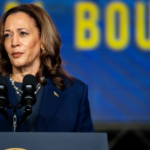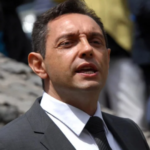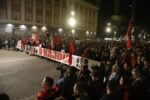In 2017, a Cyprus-based offshore company named Pimodo invested 3 million euros in ten five-star residences at the Salinas Resort in the Cape Verde archipelago in the Atlantic Ocean.
The investment funds were provided by the Russian agribusiness company Agrotorg Tulsky, a subsidiary of Russian Agricultural Bank (Rosselkhozbank), which the Russian government established in 2000 to support the agricultural sector. Agrotorg Tulsky was later purchased by Pimodo in April 2018, meaning that the bank established to develop agriculture in Russia became the owner of luxury residences in a distant state known for its white sandy beaches and as a “major transit hub for cocaine transport from South America to Europe,” according to the U.S. government.
The purchases at the Cape Verde resort open a window into the opaque circles of the Russian elite, as reported by Systema, the Russian-language research unit of Radio Free Europe. In this constellation, the brightest star is Dmitry Patrushev, 46, the Russian Deputy Prime Minister and eldest son of presidential aide and former Secretary of the Security Council, Nikolai Patrushev. Dmitry Patrushev is considered by experts to be a potential successor to Russian President Vladimir Putin, 71, should he step down, though there are no indications that he will do so.
“The biggest ‘plus’ for Dmitry Patrushev as a potential successor is the combination of a silovik and a civilian. Thanks to his father, the chekist corporation will perceive him, if not fully, at least as ‘one of their own’ and then ‘known’,” wrote political consultant and former Putin speechwriter Abbas Gallyamov, using the Russian term for high-ranking officials with military or security backgrounds. “At the same time, the majority of society – tired of military rhetoric and the endless pursuit of enemies – will not be intimidated by his ‘epaulets’.”
The main drawbacks for Patrushev, according to Gallyamov, are the scandals surrounding him and his unappealing image as a “fortunate son.”
New Nobility
Nikolai Patrushev, 73, has known Putin since the 1970s and is one of the most trusted members of the president’s inner circle. He is also the most anti-Western figure in Putin’s circle. A career officer in the KGB and the Federal Security Service (FSB), Patrushev succeeded Putin as FSB Director when then-President Boris Yeltsin appointed Putin as Prime Minister in August 1999, a quarter-century ago. Patrushev sent his two sons, Dmitry and Andrei, to the FSB Academy.
In 2000, Patrushev published a famous article defending the “rise to the highest levels of power” of the KGB, as he and Putin did, and denouncing alleged attempts to “demonize” them as a threat to democracy. He described them as “stern pragmatists” who selflessly protect the state from foreign and internal enemies.
According to him, they are the “new nobility.” Like traditional nobility, and now in some cases, this nobility is hereditary.
Dmitry Patrushev has had a prominent career under Putin. At 32, he became chairman of the Russian Agricultural Bank, the fourth-largest bank in Russia in terms of net assets. At 40, he was appointed Minister of Agriculture, and this year, at 46, he became Deputy Prime Minister overseeing agriculture, natural resources, and the environment. He regularly attends meetings with Putin in the Kremlin.
As a member of the “new nobility” in increasingly nationalist, anti-Western, and isolated Russia under Putin, Patrushev does not spend his New Year’s holidays abroad but rather with friends and family at his holiday home in the Tver region, hundreds of kilometers north of Moscow, according to a source close to the Patrushev family who wished to remain anonymous for security reasons. The house is officially owned by his wife, television personality Marina Artemyeva, with whom he is not married. Artemyeva is also the official owner of properties Patrushev owns outside Moscow and two apartments in the elite Zolotoi residential complex near the Kremlin. According to Systema’s estimates, she is officially the owner of properties worth $31 million.
In the Volga
On November 21, 2022, Patrushev, then Minister of Agriculture, hosted the opening of a poultry farm in the Siberian Tiumen region. Via video link, the event was attended by governors and business representatives from the Moscow, Kaliningrad, and Kursk regions. Putin attended virtually from the Kremlin. One of the participants Putin mentioned by name was Sergei Novikov, owner of the agribusiness Agropromkomplektatsiya.
Novikov, 64, began building his empire based on collective farms in the Tver region shortly after the fall of the Soviet Union. The company started with 200 cows on 2,000 hectares of land.
Today, the conglomerate raises about 40,000 cows and 1.3 million pigs on more than 100,000 hectares of land, nearly 17 times the size of Manhattan. The company is one of Russia’s top dairy producers and the seventh in pork production. In 2023, the company’s revenue was about $1.9 billion.
In a 2020 interview, Novikov was very explicit about the role Patrushev played in the significant growth of his company.
“We started working with the Russian Agricultural Bank in 2006,” he said. “But the biggest boost and development of our business began in 2010 with the arrival of the new team of D.N. Patrushev.”
Systema has calculated that during Patrushev’s tenure as chairman of the bank, from 2010 to 2018, he provided Novikov’s company with loans totaling $1 billion. In 2014 alone, this amount was $609 million. This money helped the company weather the avian flu outbreak that hit several Russian regions in 2013. At that time, smaller farmers accused authorities of failing to help them and only supporting large agribusinesses.
In April 2013, about a year before the Russian Agricultural Bank began providing massive loans to Novikov’s group, the agribusiness Korovinskoye was transferred from the company. This business was taken over by businessman Andrei Aleshkov, a former schoolmate of Dmitry Patrushev. In 2016, according to Novaya Gazeta Europe, Patrushev’s bank granted Aleshkov a $54 million loan to build the Praim-Taim residential complex in Moscow.
There are other indicators that Korovinskoye was under Patrushev’s wing. The new general director of the company, Ivan Pleshakov, and his new phone number were linked to a company called Trial, which provided supplies to the state emergency reserves fund, Posreserv. The investigative journalism website Proyekt had linked the Patrushevs to it in a 2023 investigation.
Korovinskoye, in addition to dealing with livestock, owns land on the banks of the Volga River in the Tver region, north of Moscow. This is where Dmitry Patrushev’s holiday home is located. Later in 2013, on a 3-hectare plot, trees were cleared. According to Google Earth images, construction began in 2014.
By 2016, the construction was nearly complete, and besides the residence, images also show other buildings, a courtyard, a football field, a boat dock, and a swimming area. At the same time, Korovinskoye began selling other plots, likely at prices lower than market value. In 2016, the company recorded $160,000 in revenue, while the land sold was worth at least five times that amount.
Two of the four plots were officially transferred to Novikov. However, a source close to the Patrushev family said the family regularly spent the year-end holidays there. In 2023, Novikov transferred the land plots to Patrushev’s ownership, according to documents obtained by Systema.
The other two plots of Korovinskoye’s land were transferred to entrepreneur Andrei Sadovsky, who still owns them.
“Recreation and Sport”
The owner of the poultry farm that Putin and Patrushev opened in November 2022 was Naum Babayev. His agribusiness, Damate, is one of the largest turkey producers in the world, according to the company’s website, and the Russian Agricultural Bank played a significant role in growing this company.
Over the years, Patrushev’s bank provided Babayev’s company with more than $1.2 billion. Furthermore, Babayev was consistently allowed to acquire some of the bank’s at-risk assets under favorable conditions.
“It turned out that we became the cleaners of the Russian Agricultural Bank in the Penzas region,” Babayev joked in an interview with Russian Forbes in 2020.
In 2020, Patrushev’s bank allowed Babayev to bankrupt his main competitor, a company called Yevrodon.
By 2018, the bank’s distressed asset department was led by Dmitry Sergeyev, a key figure in Patrushev’s inner circle. Sergeyev and Babayev have had business connections for a long time, and Sergeyev’s wife and the couple’s eldest son also have partnerships with Babayev.
Patrushev and Sergeyev have known each other since at least 2000 when they were both senior executives at the state-controlled VTB bank. Sergeyev became Patrushev’s deputy at VTB, his first deputy at the Russian Agricultural Bank, and later Deputy Minister of Agriculture.
In 2019, Sergeyev was appointed chairman of the United Grain Company (OZK), a state agricultural corporation managing the state’s grain infrastructure and under the Ministry of Agriculture.
At least one Telegram channel has referred to Sergeyev as Patrushev’s “right hand.”
According to a source from Systema close to the Patrushev family, Dmitry Patrushev’s family sometimes spends vacations with the Sergeyev family, and Sergeyev has a vacation home not far from Patrushev’s residence. The person who acquired the land adjacent to Patrushev’s property, Andrei Sadovski, is Sergeyev’s brother-in-law.
In March 2023, forestry authorities in the Tver region auctioned off a forest parcel adjacent to Patrushev’s land. Sergeyev won the auction with the starting price of $2,700 and took control of two hectares of forest for 49 years.
The forest has already been taken under control and cleared of many trees, according to Google Earth images. According to lease agreements, the land can be used for “recreation and sports.”
In 2018, the Russian Agricultural Bank branch took control of the Cypriot offshore company Pimodo and its investments in the resort in Cape Verde. Pimodo was represented by Montenegrin businessman Stela Kolman, according to the Cypriot corporate register. Kolman had business connections through the Montenegrin company Open Investment with the former manager of the Agricultural Bank of Russia, Ivan Chepovoi. Chepovoi had been Sergeyev’s deputy at VTB Bank and had worked again under him in the risk assets department at the Agricultural Bank of Russia. Chepovoi is now Sergeyev’s deputy at OZK.
This situation lasted until at least 2022, when Russia began its full-scale invasion of Ukraine, making it necessary to protect Russian assets abroad. Three weeks before the invasion began on February 24, Pimodo was sold to another offshore company called Fiosal Ventures. According to the Cypriot corporate register, Fiosal Ventures had indirect links with Agropromkomplektatsiya of Novikov.
“Our best colleagues, the pride of the FSB, did not put money before work,” Nikolai Patrushev said in a 2000 article where he discussed the “new nobility.” “They all look different, but there is a very special characteristic that unites these people, which is a very important quality: their sense of service.”







